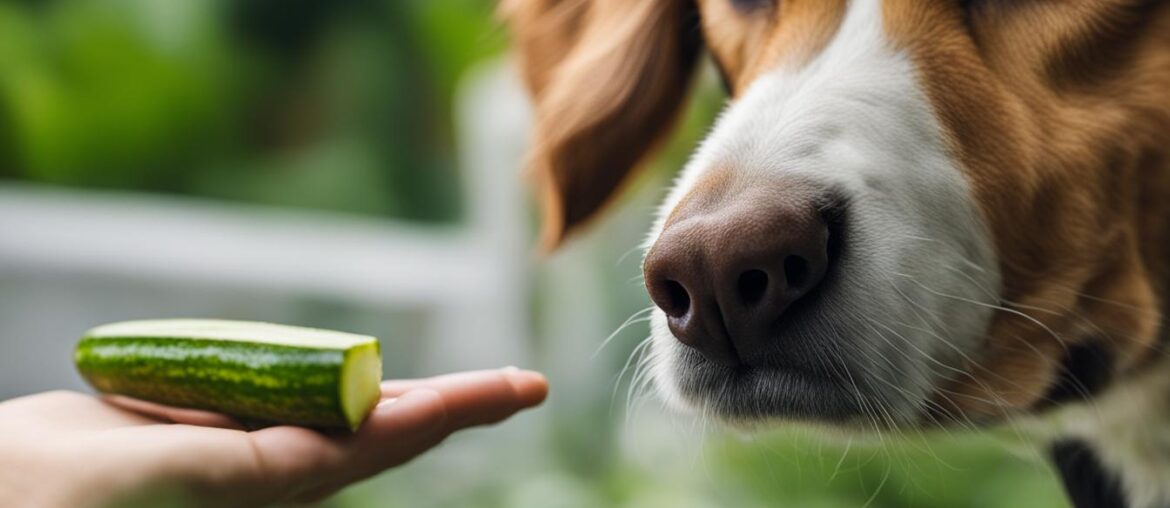As a responsible dog owner, you may wonder if it’s safe to feed your furry friend raw zucchini. In this article, I will explore the topic of dogs and raw zucchini, discussing whether it is safe for dogs to consume, the benefits it can offer, and how to incorporate it into their diet safely.
Key Takeaways:
- Feeding dogs raw zucchini can be safe when done in moderation and following certain guidelines.
- Raw zucchini is rich in fiber, vitamins, and minerals, making it a nutritious addition to your dog’s diet.
- Cooked zucchini is easier for dogs to digest and should be preferred over raw zucchini.
- Avoid seasoning or additives that can be harmful to dogs when preparing zucchini.
- Consult with your veterinarian to determine the appropriate portion size for your dog.
Is Zucchini Safe for Dogs?
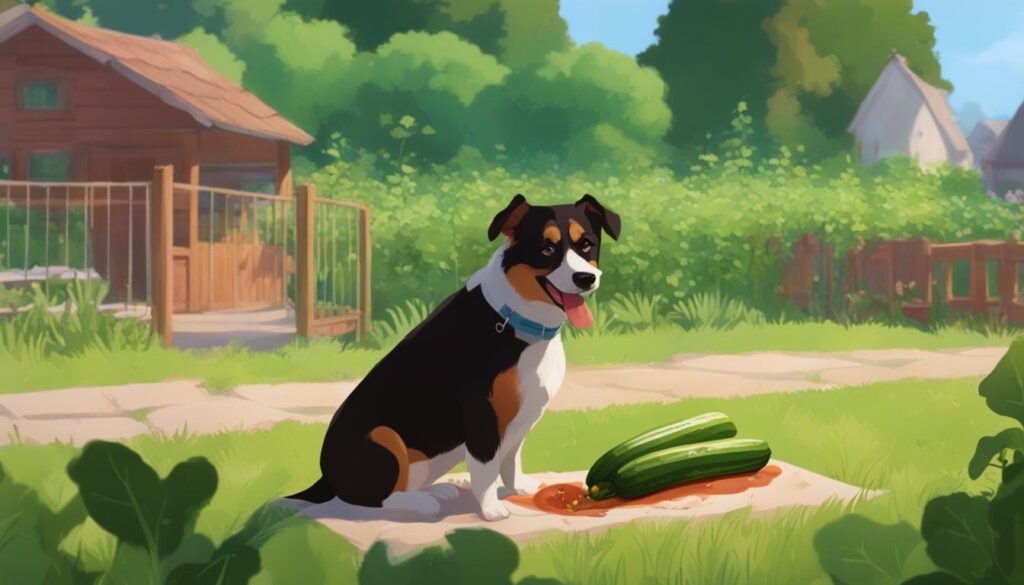
Zucchini is safe for dogs to eat. As a responsible pet owner, it’s important to consider the safety and well-being of our furry friends when introducing new foods into their diet. Fortunately, zucchini can be a healthy and nutritious option for dogs when fed in moderation.
Feeding dogs zucchini can provide them with various health benefits. Zucchini is low in calories and packed with essential vitamins and minerals, including vitamin C, vitamin K, and potassium. It also contains dietary fiber, which can support healthy digestion and aid in weight management for dogs.
However, it’s crucial to remember that moderation is key. Just like with any human food, feeding excessive amounts of zucchini to dogs can lead to digestive upset, including diarrhea or stomach discomfort. It’s important to observe your dog for any adverse reactions and adjust the portion sizes accordingly.
The Importance of Introduction and Observation
When introducing zucchini into your dog’s diet, it’s essential to start with small portions and gradually increase the amount over time. This allows their digestive system to adjust and reduces the risk of any adverse reactions.
Additionally, it’s crucial to be aware of any potential allergies or sensitivities your dog may have. Some dogs may be sensitive to certain foods, including zucchini. If you notice any signs of allergies, such as itching, swelling, or gastrointestinal upset, it’s best to discontinue feeding zucchini and consult with your veterinarian.
The Role of Variety in a Dog’s Diet
While zucchini can be a healthy addition to your dog’s diet, it’s important to emphasize that a balanced and varied diet is essential for their overall well-being. Zucchini should not be the sole source of nutrition for dogs, but rather a complement to their regular meals.
Providing a variety of fruits and vegetables, alongside high-quality commercial dog food, ensures that your dog receives all the necessary nutrients for optimal health. Consulting with your veterinarian for guidance on appropriate portion sizes and dietary requirements for your specific dog is highly recommended.
Is Zucchini Good for Dogs?
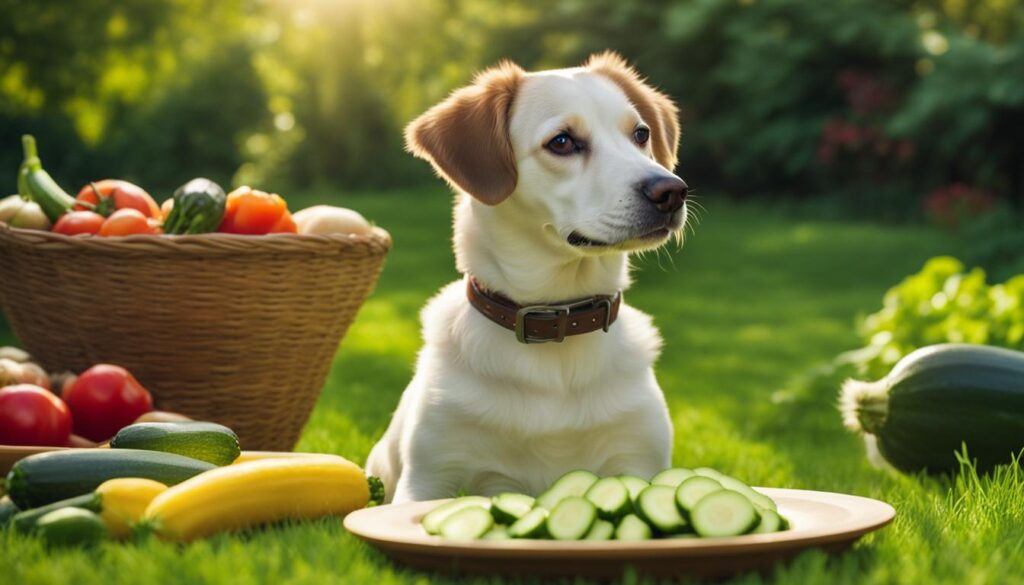
Zucchini is a nutrient-packed vegetable that can be a healthy treat for dogs. It contains a variety of beneficial nutrients, including fiber, vitamins, and minerals, which can contribute to your dog’s overall health and well-being.
One of the key benefits of zucchini for dogs is its high fiber content. Fiber plays a crucial role in maintaining a healthy digestive system and can help regulate bowel movements. By adding zucchini to your dog’s diet, you can support healthy digestion and reduce the risk of gastrointestinal issues.
Zucchini is also a good source of vitamins and minerals, including vitamins A, C, and K, as well as potassium, magnesium, and manganese. These nutrients are essential for various bodily functions and can help support your dog’s immune system, promote healthy skin and coat, and maintain proper muscle and nerve function.
Furthermore, zucchini is low in calories, making it a great option for dogs who need to maintain a healthy weight or are on a weight management diet. It can be used as a low-calorie, nutritious alternative to traditional dog treats and rewards.
However, it’s important to note that dogs generally receive all the necessary nutrients from their regular diet. While zucchini can be a beneficial addition, it should be considered as an occasional treat rather than a staple in your dog’s daily meals. Moderation is key when feeding zucchini to dogs, as excessive consumption can lead to digestive upset or imbalances.
As a responsible dog owner, it’s crucial to consult with your veterinarian before making any significant changes to your dog’s diet. Your vet can provide personalized advice based on your dog’s individual needs and dietary requirements.
Incorporating zucchini as a healthy treat for your dog can provide additional nutrients and variety to their diet. Whether you choose to feed it raw, cooked, or in the form of homemade treats, always ensure that the zucchini is plain and free from any seasonings or additives that could be harmful to your dog.
By offering zucchini as an occasional treat, you can provide your dog with a tasty and nutritious snack that can contribute to their overall health and well-being.
| Nutrient | Amount per 100g of Zucchini |
|---|---|
| Calories | 17 |
| Fiber | 1g |
| Protein | 1g |
| Vitamin C | 17mg |
| Vitamin A | 200IU |
| Potassium | 250mg |
Table: Nutritional Composition of Zucchini per 100g
How Much Zucchini Should You Feed Your Dog?
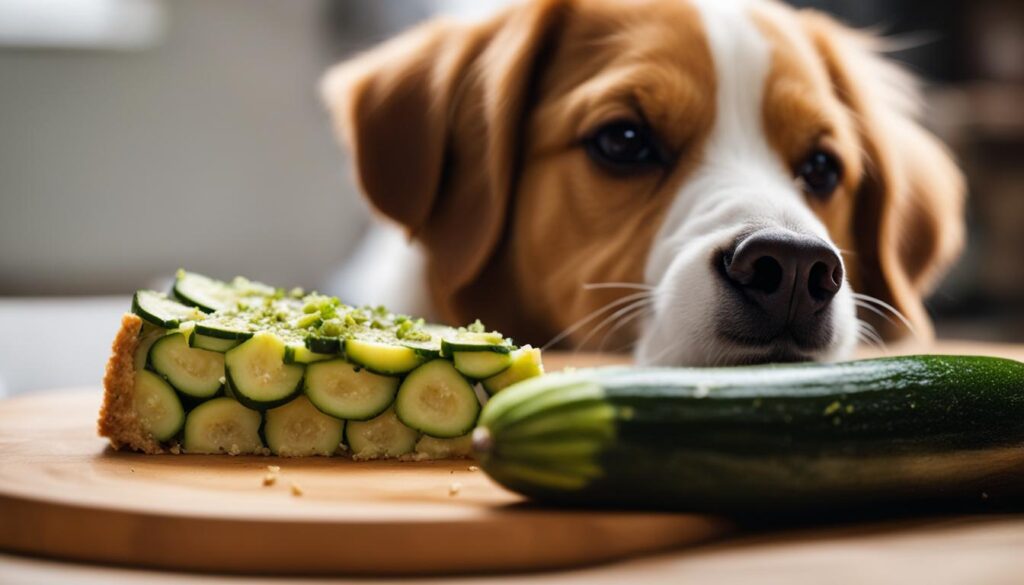
When it comes to feeding zucchini to your dog, moderation is key. It’s important to remember that treats should make up less than 10 percent of your dog’s overall diet, and this includes zucchini. While zucchini can provide some health benefits, it should be given in appropriate portion sizes.
The specific portion size of zucchini for your dog will depend on their size. Larger dogs will generally require a larger portion of zucchini compared to smaller dogs. To determine the ideal portion size for your furry friend, it’s always best to consult with your veterinarian. They can take into account your dog’s breed, age, weight, and overall health to provide personalized feeding recommendations.
Feeding your dog the appropriate amount of zucchini ensures that they receive the nutritional benefits without overdoing it. It also helps prevent digestive upset and maintains a balanced diet for your canine companion.
Portion Size Guidelines for Feeding Zucchini to Dogs:
| Dog Size | Portion Size |
|---|---|
| Small (up to 20 lbs) | 1-2 tablespoons of cooked or raw zucchini |
| Medium (21-50 lbs) | 2-4 tablespoons of cooked or raw zucchini |
| Large (51-90 lbs) | 1/4 to 1/2 cup of cooked or raw zucchini |
| Giant (over 90 lbs) | 1/2 to 1 cup of cooked or raw zucchini |
Remember, these portion sizes are general guidelines and should be adjusted based on your dog’s individual needs. It’s always best to monitor your dog’s weight and consult with your veterinarian if you have any concerns or questions about feeding zucchini or other vegetables to your dog.
Can Dogs Eat Cooked Zucchini and Other Zucchini Products?
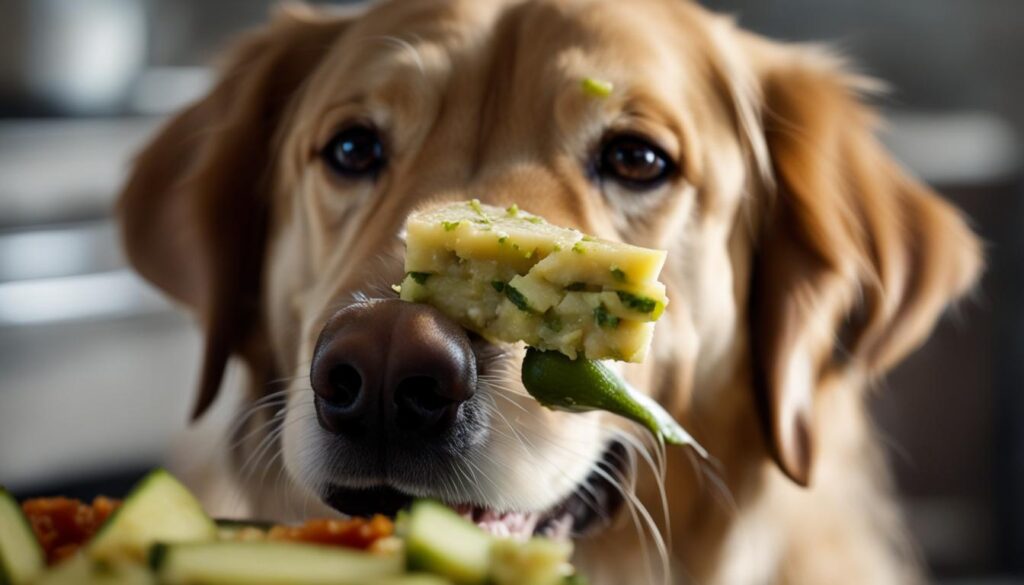
Dogs can enjoy both raw and cooked zucchini, but cooked zucchini is generally easier for them to digest. When preparing cooked zucchini for your furry friend, it’s crucial to steer clear of any harmful seasonings or ingredients that could be toxic to dogs, such as garlic and onions. It’s important to remember that not all zucchini products are safe for dogs. Some zucchini products, like zucchini bread or casseroles, may contain ingredients that are not suitable for canine consumption. To ensure the health and safety of your dog, it’s best to stick with plain, unseasoned zucchini as a treat or addition to their diet.
I always recommend cooking zucchini for dogs to enhance its digestibility and avoid any potential risks associated with raw vegetables. Remember, dogs have different digestive systems than humans, so it’s important to be cautious when introducing new foods into their diet.
Feeding Cooked Zucchini to Dogs
Cooked zucchini is a great way to offer your dog a nutritious and flavorful treat. However, it’s important to follow a few guidelines when cooking zucchini for your four-legged companion:
- Choose fresh and organic zucchini whenever possible to ensure it’s free from harmful chemicals or pesticides.
- Thoroughly wash the zucchini before cooking to remove any dirt or residue.
- Remove the stem and cut the zucchini into small, bite-sized pieces for easier consumption.
- Steam, bake, or lightly sauté the zucchini without adding any oils, salt, spices, or seasonings.
- Allow the cooked zucchini to cool completely before offering it to your dog.
By following these steps, you can provide your dog with a safe and delicious cooked zucchini snack.
Other Zucchini Products for Dogs
While plain, cooked zucchini is generally safe for dogs, it’s important to be cautious when it comes to other zucchini products. Commercially available zucchini products, such as zucchini bread or zucchini-based dog treats, may contain additional ingredients, such as sugars, flours, or preservatives, that may not be suitable for canine consumption.
When it comes to zucchini products, it’s best to stick with homemade options where you have full control over the ingredients. Opt for plain zucchini treats or consider incorporating shredded zucchini into homemade dog food recipes to offer your dog a taste of this nutritious vegetable.
Remember, if you’re unsure about the safety or nutritional value of any zucchini product, it’s always best to consult with your veterinarian for professional advice.
Zucchini Products for Dogs – A Comparison Table:
| Zucchini Product | Description | Suitable for Dogs? |
|---|---|---|
| Zucchini Bread | A baked product made with zucchini, flour, sugar, and other ingredients. | No |
| Zucchini Dog Treats | Commercial or homemade treats specifically made for dogs using zucchini as an ingredient. | Check ingredient list |
| Plain Zucchini | Raw or cooked zucchini without any added ingredients or seasonings. | Yes |
When it comes to zucchini products, it’s essential to prioritize your dog’s well-being and choose options that are safe and beneficial for their health.
Are Zucchini Plants Toxic to Dogs?
Zucchini plants, including the flowers and leaves, are non-toxic to dogs. In fact, zucchini flowers are often cooked and consumed by humans. However, if your dog is roaming in your garden, it’s important to ensure that they are not eating any other potentially harmful plants besides zucchini.
Dogs have a curious nature and may explore various plants and flowers in your garden. While zucchini plants pose no toxicity risk, there are many other plants and flowers that can be harmful or even deadly to dogs if ingested.
Common Toxic Plants for Dogs:
It’s essential to identify and remove any toxic plants from your garden to keep your dog safe. Here are some common plants that may be toxic to dogs:
- Aloe Vera
- Azaleas
- Chrysanthemums
- Daffodils
- Lilies
- Rhododendrons
- Tulips
These plants can cause various symptoms in dogs, such as gastrointestinal upset, vomiting, diarrhea, abdominal pain, lethargy, excessive drooling, tremors, seizures, and even organ failure in severe cases. If you suspect your dog has ingested any toxic plants or flowers, it’s crucial to contact your veterinarian immediately.
Tips to Ensure Garden Safety:
To prevent your dog from ingesting harmful plants in your garden, consider the following precautions:
- Research and identify toxic plants so that you can remove them from your garden.
- Use barriers or fencing to prevent your dog from accessing certain areas of your garden.
- Supervise your dog while they are outside to prevent them from eating any unidentified plants.
- Teach your dog the “Leave It” command to discourage them from approaching and ingesting plants.
- Redirect your dog’s attention by providing them with safe chew toys and treats.
By being proactive and ensuring the safety of your garden, you can create a dog-friendly environment where your furry friend can explore and play without any risks of toxicity.
| Plant Name | Toxicity Level |
|---|---|
| Zucchini Plant | Non-toxic |
| Aloe Vera | Toxic |
| Azaleas | Toxic |
| Chrysanthemums | Toxic |
| Daffodils | Toxic |
| Lilies | Toxic |
| Rhododendrons | Toxic |
| Tulips | Toxic |
Zucchini as Part of a Balanced Diet for Dogs
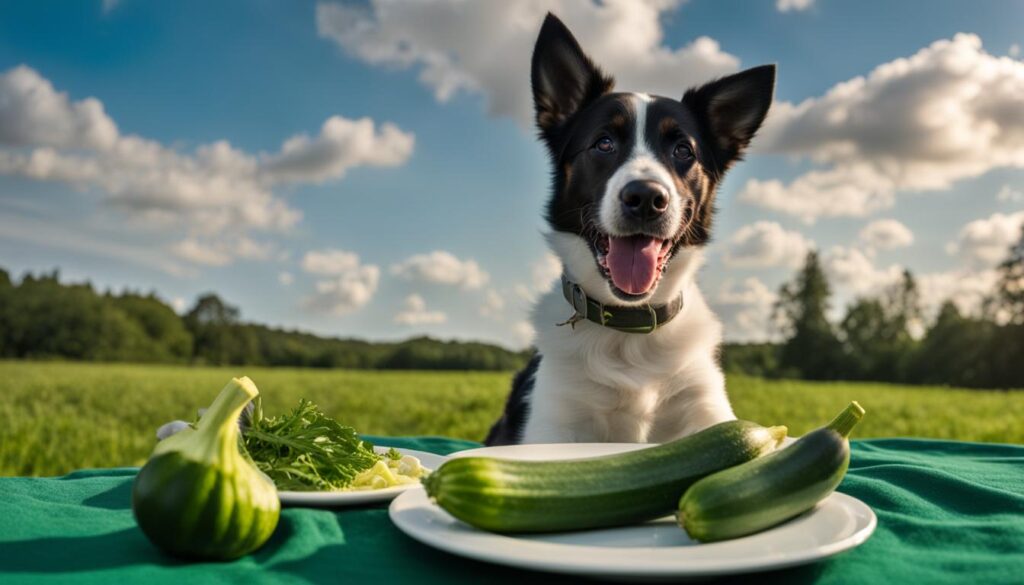
When it comes to feeding your dog, it’s crucial to ensure they have a balanced diet that meets their specific nutritional needs. While zucchini can be a nutritious addition to their meals, it should be viewed as a treat or occasional addition rather than a staple in their diet.
Dogs generally get all the essential nutrients they need from their regular food, whether it’s commercial dog food or a balanced homemade diet. These diets are specifically formulated to provide the right balance of proteins, carbohydrates, fats, vitamins, and minerals for your furry friend.
Instead of relying on zucchini as a primary source of nutrition, consider it as a healthy and tasty treat. Adding small amounts of zucchini to their diet can provide some extra fiber, vitamins, and minerals, but it should not replace the essential components of their regular meals.
I always recommend consulting with your veterinarian to ensure your dog’s diet is appropriate for their specific needs. They can provide personalized advice based on your dog’s age, breed, size, and any specific health concerns they may have.
| Dietary Components | Importance for Dogs |
|---|---|
| Proteins | Essential for muscle growth, repair, and overall body function. |
| Carbohydrates | Provide energy for daily activities and brain function. |
| Fats | Required for healthy skin and coat, as well as providing energy. |
| Vitamins and Minerals | Play a crucial role in various bodily functions and overall health. |
By ensuring your dog’s regular meals are nutritionally balanced, you can then use zucchini as an occasional treat to provide some additional variety and nutrients. Remember to always feed zucchini in moderation, as excessive amounts can lead to digestive upset.
As with any dietary changes, it’s important to introduce new foods gradually and monitor your dog for any adverse reactions. If you notice any signs of digestive discomfort or allergic reactions, discontinue feeding zucchini and consult your veterinarian.
In conclusion, while zucchini can offer some nutritional benefits for dogs, it should be incorporated as part of a balanced diet rather than a primary food source. Consult with your veterinarian to ensure your dog’s diet meets their specific needs, and remember to use zucchini as a well-deserved treat to add some variety to their meals.
Other Safe Vegetables for Dogs
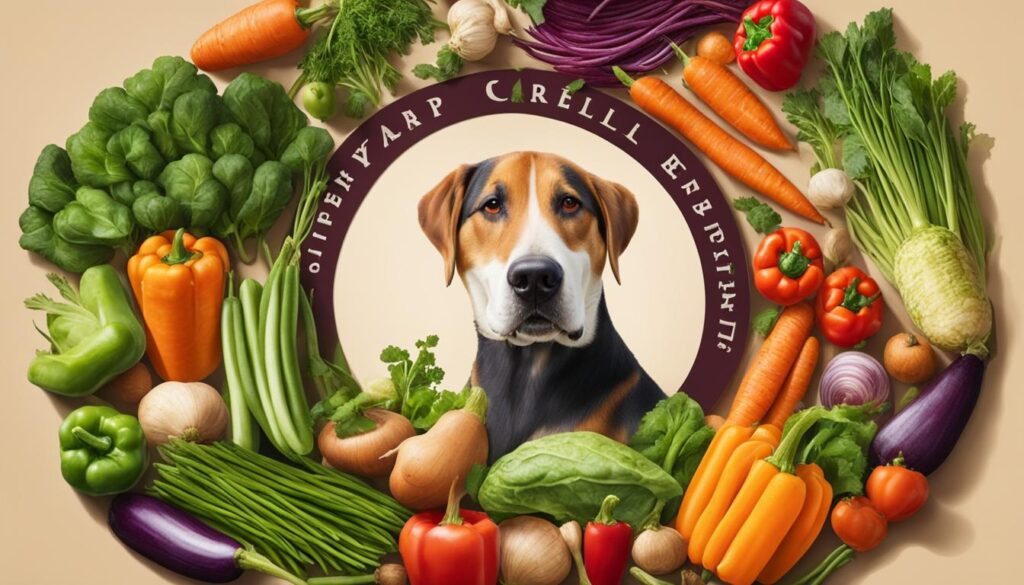
Zucchini is not the only safe vegetable for dogs. There are several other vegetables that are generally considered safe for canine consumption:
1. Beans: Green beans and kidney beans are packed with fiber and can be served cooked or as a crunchy snack.
2. Broccoli: This nutrient-rich vegetable is high in vitamins C and K. It can be steamed or served raw in small, bite-sized pieces.
3. Carrots: Carrots are a crunchy and low-calorie treat for dogs. They are rich in vitamins and can help support good dental health.
4. Cauliflower: Cauliflower is a great source of antioxidants and fiber. It can be served cooked or raw as a healthy snack.
5. Celery: Celery is low in calories and high in fiber. It can be served as a crunchy treat for dogs.
6. Cucumbers: Cucumbers are hydrating and low in calories. They can be sliced and served as a refreshing snack.
7. Green beans: Green beans are a good source of fiber and can be served cooked or raw.
8. Lettuce: Leafy greens like lettuce are low in calories and can be served as a healthy addition to your dog’s diet.
9. Peas: Peas are a good source of vitamins and fiber. They can be served cooked or as a tasty frozen treat.
10. Spinach: Spinach is packed with antioxidants and can be served cooked or raw. However, it should be fed in moderation due to its high oxalate content.
11. Sweet potatoes: Sweet potatoes are rich in vitamins and fiber. They can be cooked and served as a nutritious treat.
12. Tomatoes: Ripe tomatoes can be a healthy treat for dogs, but avoid feeding them the leaves and stems, as they can be toxic.
It’s important to note that while these vegetables are generally safe for dogs, it’s always a good idea to introduce new foods in small quantities and monitor your dog for any adverse reactions. Consulting with your veterinarian is also recommended to ensure that the vegetables you choose are suitable for your dog’s specific dietary needs.
| Vegetable | Nutritional Benefits | Serving Suggestions |
|---|---|---|
| Beans | High in fiber and protein | Serve cooked or as a crunchy snack |
| Broccoli | Rich in vitamins C and K | Steam or serve raw in small pieces |
| Carrots | Low-calorie, good for dental health | Serve raw or cooked as a crunchy treat |
| Cauliflower | High in antioxidants and fiber | Cooked or raw as a healthy snack |
| Celery | Low in calories, high in fiber | Serve as a crunchy treat |
| Cucumbers | Hydrating, low in calories | Slice and serve as a refreshing snack |
| Green beans | Good source of fiber | Serve cooked or raw |
| Lettuce | Low in calories | Healthy addition to your dog’s diet |
| Peas | Source of vitamins and fiber | Cooked or frozen as a treat |
| Spinach | Rich in antioxidants | Cooked or raw in small quantities |
| Sweet potatoes | High in vitamins and fiber | Cooked and served as a treat |
| Tomatoes | Nutritious, but avoid leaves and stems | Serve ripe tomatoes in small amounts |
Health Benefits of Zucchini for Dogs
Zucchini offers several health benefits for dogs. It is rich in antioxidants, particularly carotenoids, which help protect the body from free radicals and oxidative stress. Antioxidants play a crucial role in supporting the immune system and preventing cell damage, promoting overall health and well-being in dogs.
In addition to antioxidants, zucchini is high in fiber, which aids in digestion and can help maintain a healthy digestive system for your furry friend. A diet that includes an adequate amount of fiber can reduce the risk of constipation and other gastrointestinal issues in dogs.
Zucchini is also packed with essential vitamins and minerals that contribute to your dog’s overall health. It is a good source of vitamins A, C, B6, and K, which are essential for proper cell function, immune support, and bone health. Additionally, zucchini contains minerals like potassium, zinc, manganese, magnesium, copper, and phosphorus, which are necessary for various bodily functions in dogs.
By including zucchini in your dog’s diet, you can provide them with a nutritious and delicious treat that offers various health benefits. However, remember to introduce zucchini gradually, monitor your dog’s reaction, and consult with your veterinarian regarding portion sizes and overall dietary needs.
| Health Benefits of Zucchini for Dogs: |
|---|
| Antioxidant-rich |
| High in fiber for improved digestion |
| Good source of vitamins A, C, B6, and K |
| Contains essential minerals like potassium, zinc, manganese, magnesium, copper, and phosphorus |
Potential Risks of Zucchini for Dogs
While zucchini is generally safe for dogs, there are some potential risks to be aware of. Bitter zucchini can be toxic due to the presence of cucurbitacins, which can cause nausea, stomach cramps, diarrhea, and vomiting in humans. To avoid bitter zucchini, it’s best to choose smaller, younger zucchinis and taste them before feeding them to your dog. Additionally, it’s important to properly prepare zucchini by removing the stalk, cooking or pureeing it for digestibility, and avoiding any harmful additives.
Potential Risks of Zucchini for Dogs
| Potential Risks | Symptoms |
|---|---|
| Bitter zucchini | • Nausea |
| • Stomach cramps | |
| • Diarrhea | |
| • Vomiting |
Wrapping Up
In conclusion, it is safe to feed raw zucchini to dogs in moderation as part of a balanced diet. Zucchini offers numerous health benefits for dogs, including antioxidants, fiber, vitamins, and minerals. However, it is essential to feed zucchini safely and avoid any harmful additives or seasonings. Additionally, being mindful of portion sizes is crucial to prevent digestive upset and maintain your dog’s overall well-being.
If you have any concerns or questions about feeding zucchini or other human foods to your dog, it is always best to consult with your veterinarian for personalized advice. They can provide guidance specific to your dog’s age, size, breed, and individual dietary needs. Your vet will also help you determine the appropriate amount of zucchini to include in your dog’s diet based on their overall nutritional requirements.
Remember, while zucchini can be a healthy addition to your dog’s diet, it should not replace their regular dog food. It is meant to be an occasional treat or supplement rather than a primary source of nutrition. By following these guidelines and seeking professional advice, you can ensure that your furry friend enjoys the benefits of zucchini while adhering to their specific dietary needs.
FAQ
Can dogs eat raw zucchini?
Yes, dogs can eat raw zucchini. However, it should be fed in moderation to avoid digestive upset.
Is raw zucchini safe for dogs?
Raw zucchini is generally safe for dogs to eat. However, it’s important to be mindful of portion sizes and potential allergies or sensitivities.
What are the benefits of feeding dogs raw zucchini?
Raw zucchini is rich in fiber, vitamins, and minerals, making it a nutritious addition to your dog’s diet. It can help with digestion and overall health.
Can dogs eat the skin of zucchini?
Yes, dogs can eat the skin of zucchini. However, it’s important to wash it thoroughly to remove any chemicals or pesticides.
How much raw zucchini should you feed your dog?
The amount of raw zucchini you should feed your dog depends on their size. It’s best to consult with your veterinarian to determine the appropriate portion size.
Can dogs eat cooked zucchini and other zucchini products?
Yes, dogs can eat cooked zucchini. However, it’s important to avoid adding any harmful seasonings or ingredients. Zucchini products like zucchini bread may contain ingredients that are not suitable for dogs, so it’s best to stick with plain, unseasoned zucchini.
Are zucchini plants toxic to dogs?
Zucchini plants, including the flowers and leaves, are non-toxic to dogs. However, it’s important to ensure that your dog is not eating any other potentially harmful plants in your garden.
Is zucchini part of a balanced diet for dogs?
Zucchini can be part of a balanced diet for dogs. However, it should be considered as a treat or occasional addition rather than a staple in their diet. Dogs generally get all the nutrients they need from their regular food.
What are other safe vegetables for dogs to eat?
Other safe vegetables for dogs include beans, broccoli, carrots, cauliflower, celery, cucumbers, green beans, lettuce, peas, spinach, sweet potatoes, and tomatoes. However, it’s important to avoid vegetables like onions, garlic, and chives, as they can be toxic to dogs.
What are the health benefits of zucchini for dogs?
Zucchini is rich in antioxidants, fiber, vitamins, and minerals, which can contribute to your dog’s overall health. It can help protect the body from free radicals, aid in digestion, and provide essential nutrients.
What are the potential risks of zucchini for dogs?
While zucchini is generally safe for dogs, bitter zucchini can be toxic due to the presence of cucurbitacins. It’s important to choose smaller, younger zucchinis and taste them before feeding them to your dog to avoid any bitterness.
Can you feed raw zucchini to dogs?
Yes, you can feed raw zucchini to dogs. However, it’s important to feed it in moderation and be aware of any potential risks or allergies your dog may have. It’s best to consult with your veterinarian for personalized advice on your dog’s diet.


